Hospitality Provision in Travel and Tourism: A Business Report
VerifiedAdded on 2020/12/10
|13
|4078
|364
Report
AI Summary
This report provides a comprehensive analysis of hospitality provision within the travel and tourism sector. It begins by defining hospitality and outlining its scope and scale, emphasizing the crucial relationship between hospitality and tourism. The report then delves into integration strategies within the hospitality sector, discussing both horizontal and vertical integration, using Marriott as a case study. It examines the impacts of these integration methods, both positive and negative, on an organization's performance and market position. Furthermore, the report includes a project proposal for Marriott Hotels & Resorts, detailing reasons for establishing the business, target markets, locations, and staffing considerations based on market potential analysis. The report concludes by summarizing the key findings and implications of the analysis.
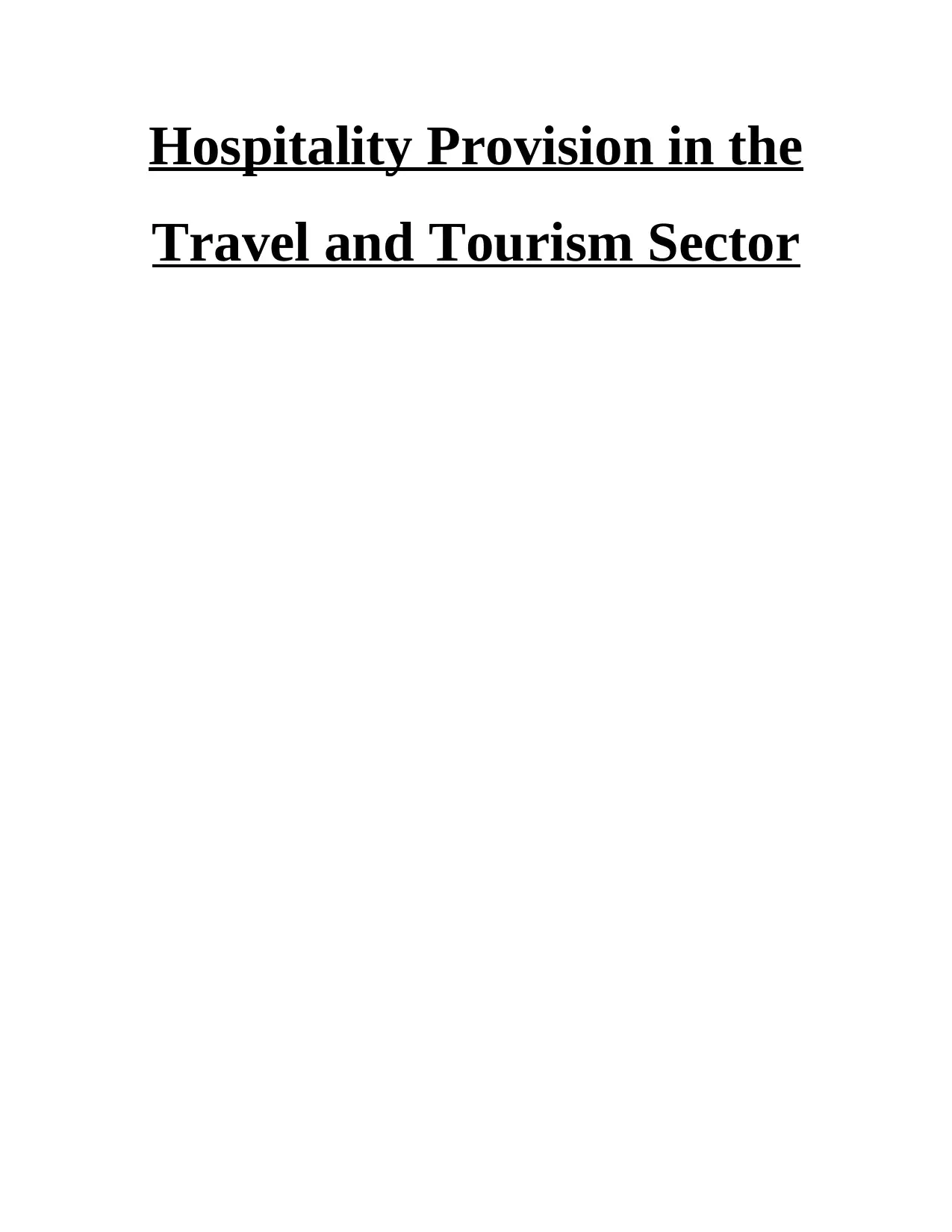
Hospitality Provision in the
Travel and Tourism Sector
Travel and Tourism Sector
Paraphrase This Document
Need a fresh take? Get an instant paraphrase of this document with our AI Paraphraser
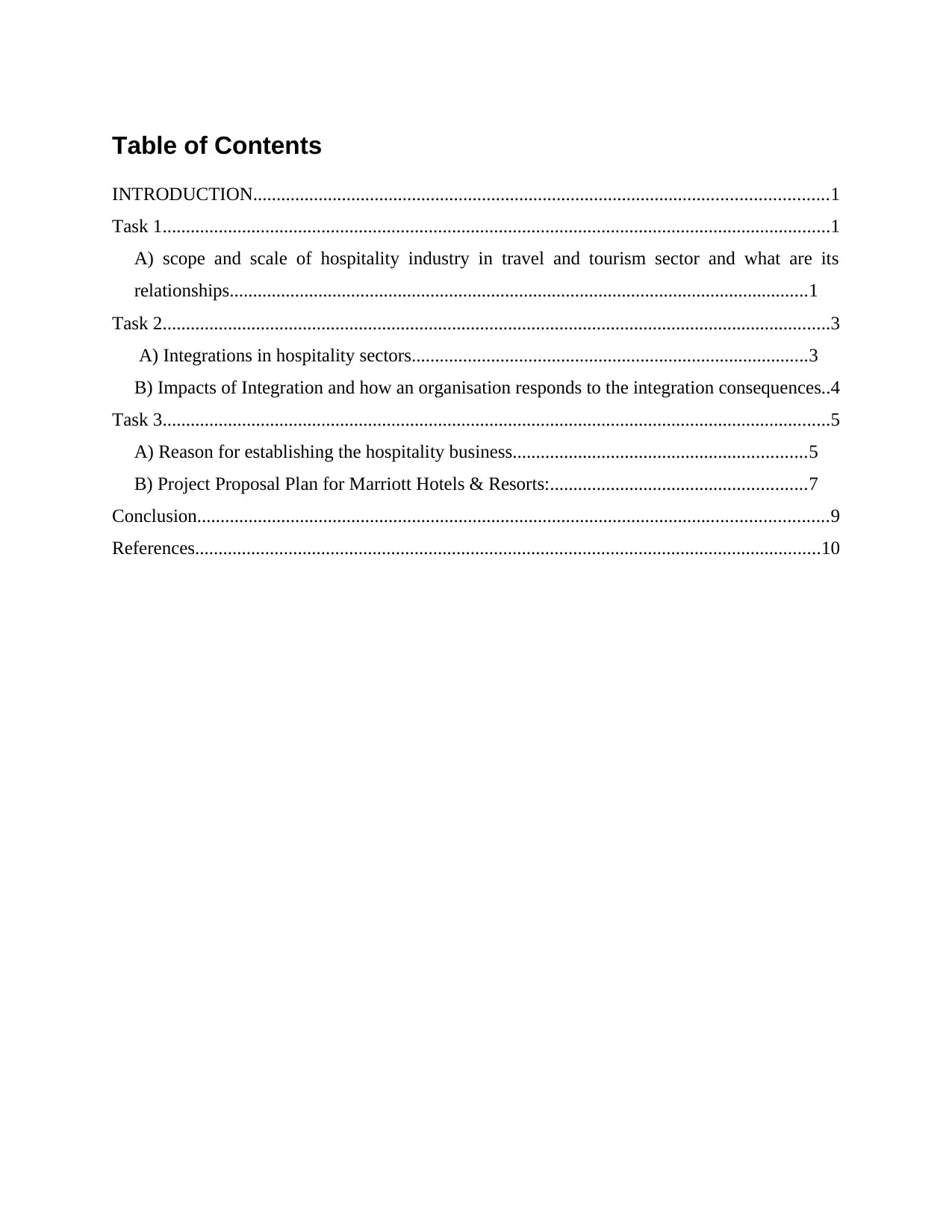
Table of Contents
INTRODUCTION...........................................................................................................................1
Task 1...............................................................................................................................................1
A) scope and scale of hospitality industry in travel and tourism sector and what are its
relationships............................................................................................................................1
Task 2...............................................................................................................................................3
A) Integrations in hospitality sectors.....................................................................................3
B) Impacts of Integration and how an organisation responds to the integration consequences..4
Task 3...............................................................................................................................................5
A) Reason for establishing the hospitality business...............................................................5
B) Project Proposal Plan for Marriott Hotels & Resorts:.......................................................7
Conclusion.......................................................................................................................................9
References......................................................................................................................................10
INTRODUCTION...........................................................................................................................1
Task 1...............................................................................................................................................1
A) scope and scale of hospitality industry in travel and tourism sector and what are its
relationships............................................................................................................................1
Task 2...............................................................................................................................................3
A) Integrations in hospitality sectors.....................................................................................3
B) Impacts of Integration and how an organisation responds to the integration consequences..4
Task 3...............................................................................................................................................5
A) Reason for establishing the hospitality business...............................................................5
B) Project Proposal Plan for Marriott Hotels & Resorts:.......................................................7
Conclusion.......................................................................................................................................9
References......................................................................................................................................10
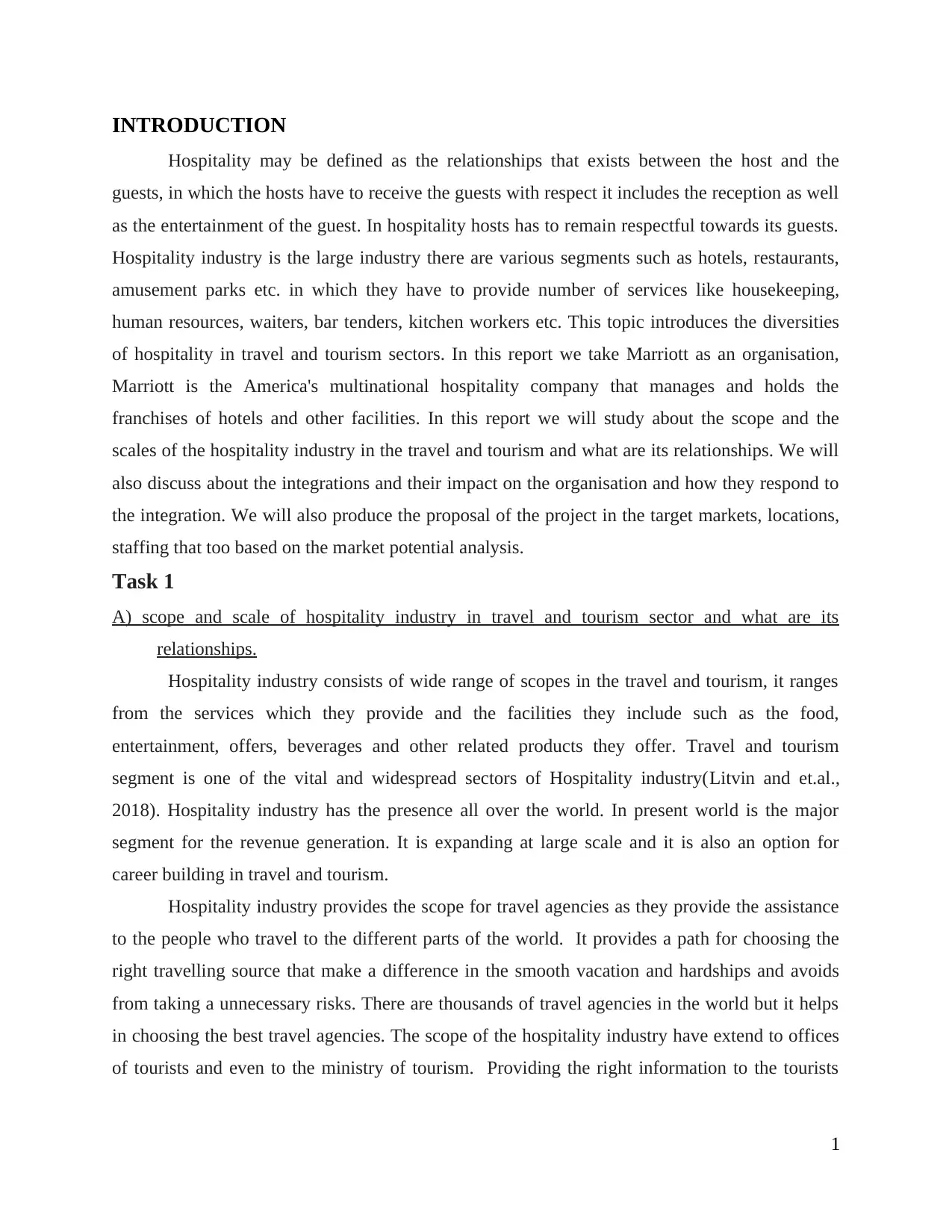
INTRODUCTION
Hospitality may be defined as the relationships that exists between the host and the
guests, in which the hosts have to receive the guests with respect it includes the reception as well
as the entertainment of the guest. In hospitality hosts has to remain respectful towards its guests.
Hospitality industry is the large industry there are various segments such as hotels, restaurants,
amusement parks etc. in which they have to provide number of services like housekeeping,
human resources, waiters, bar tenders, kitchen workers etc. This topic introduces the diversities
of hospitality in travel and tourism sectors. In this report we take Marriott as an organisation,
Marriott is the America's multinational hospitality company that manages and holds the
franchises of hotels and other facilities. In this report we will study about the scope and the
scales of the hospitality industry in the travel and tourism and what are its relationships. We will
also discuss about the integrations and their impact on the organisation and how they respond to
the integration. We will also produce the proposal of the project in the target markets, locations,
staffing that too based on the market potential analysis.
Task 1
A) scope and scale of hospitality industry in travel and tourism sector and what are its
relationships.
Hospitality industry consists of wide range of scopes in the travel and tourism, it ranges
from the services which they provide and the facilities they include such as the food,
entertainment, offers, beverages and other related products they offer. Travel and tourism
segment is one of the vital and widespread sectors of Hospitality industry(Litvin and et.al.,
2018). Hospitality industry has the presence all over the world. In present world is the major
segment for the revenue generation. It is expanding at large scale and it is also an option for
career building in travel and tourism.
Hospitality industry provides the scope for travel agencies as they provide the assistance
to the people who travel to the different parts of the world. It provides a path for choosing the
right travelling source that make a difference in the smooth vacation and hardships and avoids
from taking a unnecessary risks. There are thousands of travel agencies in the world but it helps
in choosing the best travel agencies. The scope of the hospitality industry have extend to offices
of tourists and even to the ministry of tourism. Providing the right information to the tourists
1
Hospitality may be defined as the relationships that exists between the host and the
guests, in which the hosts have to receive the guests with respect it includes the reception as well
as the entertainment of the guest. In hospitality hosts has to remain respectful towards its guests.
Hospitality industry is the large industry there are various segments such as hotels, restaurants,
amusement parks etc. in which they have to provide number of services like housekeeping,
human resources, waiters, bar tenders, kitchen workers etc. This topic introduces the diversities
of hospitality in travel and tourism sectors. In this report we take Marriott as an organisation,
Marriott is the America's multinational hospitality company that manages and holds the
franchises of hotels and other facilities. In this report we will study about the scope and the
scales of the hospitality industry in the travel and tourism and what are its relationships. We will
also discuss about the integrations and their impact on the organisation and how they respond to
the integration. We will also produce the proposal of the project in the target markets, locations,
staffing that too based on the market potential analysis.
Task 1
A) scope and scale of hospitality industry in travel and tourism sector and what are its
relationships.
Hospitality industry consists of wide range of scopes in the travel and tourism, it ranges
from the services which they provide and the facilities they include such as the food,
entertainment, offers, beverages and other related products they offer. Travel and tourism
segment is one of the vital and widespread sectors of Hospitality industry(Litvin and et.al.,
2018). Hospitality industry has the presence all over the world. In present world is the major
segment for the revenue generation. It is expanding at large scale and it is also an option for
career building in travel and tourism.
Hospitality industry provides the scope for travel agencies as they provide the assistance
to the people who travel to the different parts of the world. It provides a path for choosing the
right travelling source that make a difference in the smooth vacation and hardships and avoids
from taking a unnecessary risks. There are thousands of travel agencies in the world but it helps
in choosing the best travel agencies. The scope of the hospitality industry have extend to offices
of tourists and even to the ministry of tourism. Providing the right information to the tourists
1
⊘ This is a preview!⊘
Do you want full access?
Subscribe today to unlock all pages.

Trusted by 1+ million students worldwide
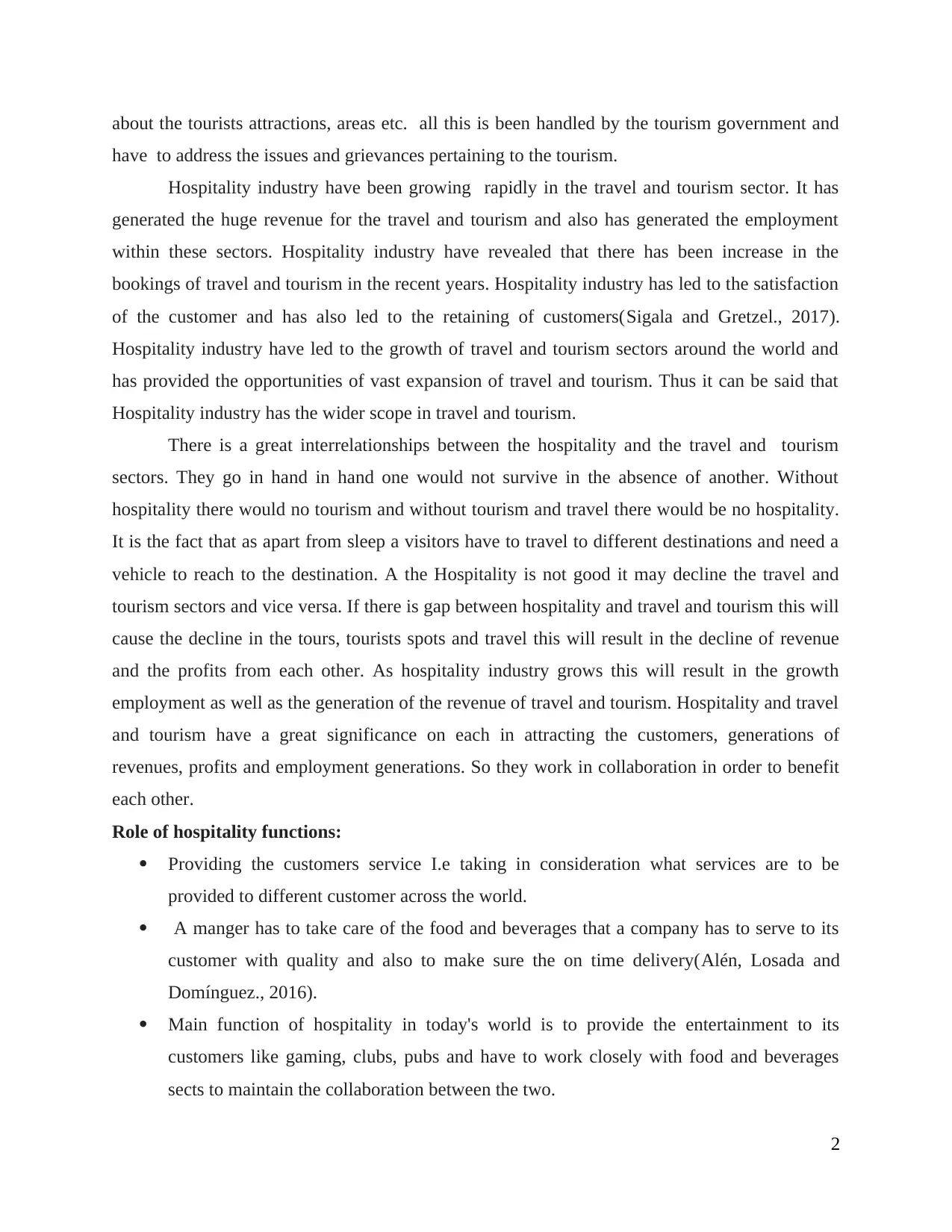
about the tourists attractions, areas etc. all this is been handled by the tourism government and
have to address the issues and grievances pertaining to the tourism.
Hospitality industry have been growing rapidly in the travel and tourism sector. It has
generated the huge revenue for the travel and tourism and also has generated the employment
within these sectors. Hospitality industry have revealed that there has been increase in the
bookings of travel and tourism in the recent years. Hospitality industry has led to the satisfaction
of the customer and has also led to the retaining of customers(Sigala and Gretzel., 2017).
Hospitality industry have led to the growth of travel and tourism sectors around the world and
has provided the opportunities of vast expansion of travel and tourism. Thus it can be said that
Hospitality industry has the wider scope in travel and tourism.
There is a great interrelationships between the hospitality and the travel and tourism
sectors. They go in hand in hand one would not survive in the absence of another. Without
hospitality there would no tourism and without tourism and travel there would be no hospitality.
It is the fact that as apart from sleep a visitors have to travel to different destinations and need a
vehicle to reach to the destination. A the Hospitality is not good it may decline the travel and
tourism sectors and vice versa. If there is gap between hospitality and travel and tourism this will
cause the decline in the tours, tourists spots and travel this will result in the decline of revenue
and the profits from each other. As hospitality industry grows this will result in the growth
employment as well as the generation of the revenue of travel and tourism. Hospitality and travel
and tourism have a great significance on each in attracting the customers, generations of
revenues, profits and employment generations. So they work in collaboration in order to benefit
each other.
Role of hospitality functions:
Providing the customers service I.e taking in consideration what services are to be
provided to different customer across the world.
A manger has to take care of the food and beverages that a company has to serve to its
customer with quality and also to make sure the on time delivery(Alén, Losada and
Domínguez., 2016).
Main function of hospitality in today's world is to provide the entertainment to its
customers like gaming, clubs, pubs and have to work closely with food and beverages
sects to maintain the collaboration between the two.
2
have to address the issues and grievances pertaining to the tourism.
Hospitality industry have been growing rapidly in the travel and tourism sector. It has
generated the huge revenue for the travel and tourism and also has generated the employment
within these sectors. Hospitality industry have revealed that there has been increase in the
bookings of travel and tourism in the recent years. Hospitality industry has led to the satisfaction
of the customer and has also led to the retaining of customers(Sigala and Gretzel., 2017).
Hospitality industry have led to the growth of travel and tourism sectors around the world and
has provided the opportunities of vast expansion of travel and tourism. Thus it can be said that
Hospitality industry has the wider scope in travel and tourism.
There is a great interrelationships between the hospitality and the travel and tourism
sectors. They go in hand in hand one would not survive in the absence of another. Without
hospitality there would no tourism and without tourism and travel there would be no hospitality.
It is the fact that as apart from sleep a visitors have to travel to different destinations and need a
vehicle to reach to the destination. A the Hospitality is not good it may decline the travel and
tourism sectors and vice versa. If there is gap between hospitality and travel and tourism this will
cause the decline in the tours, tourists spots and travel this will result in the decline of revenue
and the profits from each other. As hospitality industry grows this will result in the growth
employment as well as the generation of the revenue of travel and tourism. Hospitality and travel
and tourism have a great significance on each in attracting the customers, generations of
revenues, profits and employment generations. So they work in collaboration in order to benefit
each other.
Role of hospitality functions:
Providing the customers service I.e taking in consideration what services are to be
provided to different customer across the world.
A manger has to take care of the food and beverages that a company has to serve to its
customer with quality and also to make sure the on time delivery(Alén, Losada and
Domínguez., 2016).
Main function of hospitality in today's world is to provide the entertainment to its
customers like gaming, clubs, pubs and have to work closely with food and beverages
sects to maintain the collaboration between the two.
2
Paraphrase This Document
Need a fresh take? Get an instant paraphrase of this document with our AI Paraphraser
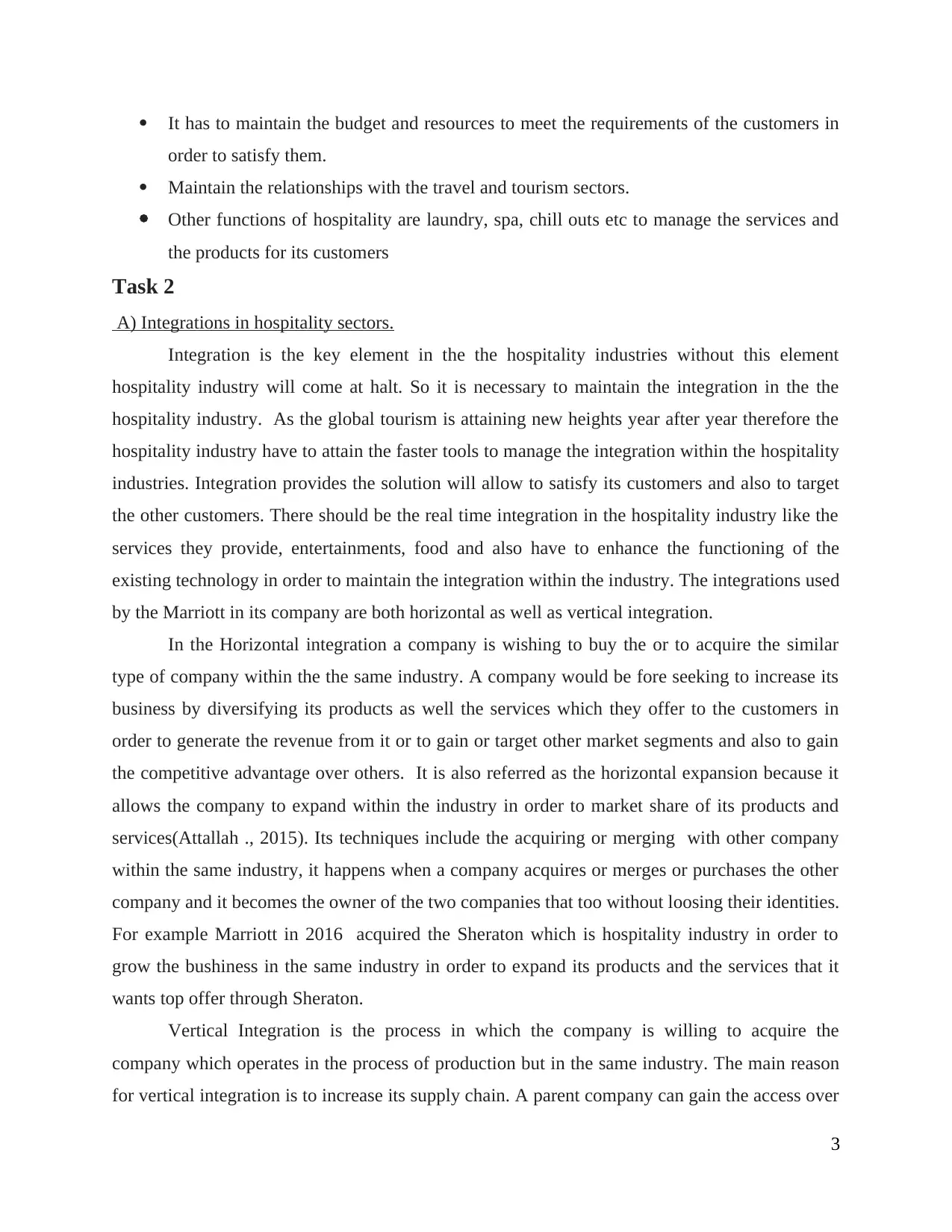
It has to maintain the budget and resources to meet the requirements of the customers in
order to satisfy them.
Maintain the relationships with the travel and tourism sectors.
Other functions of hospitality are laundry, spa, chill outs etc to manage the services and
the products for its customers
Task 2
A) Integrations in hospitality sectors.
Integration is the key element in the the hospitality industries without this element
hospitality industry will come at halt. So it is necessary to maintain the integration in the the
hospitality industry. As the global tourism is attaining new heights year after year therefore the
hospitality industry have to attain the faster tools to manage the integration within the hospitality
industries. Integration provides the solution will allow to satisfy its customers and also to target
the other customers. There should be the real time integration in the hospitality industry like the
services they provide, entertainments, food and also have to enhance the functioning of the
existing technology in order to maintain the integration within the industry. The integrations used
by the Marriott in its company are both horizontal as well as vertical integration.
In the Horizontal integration a company is wishing to buy the or to acquire the similar
type of company within the the same industry. A company would be fore seeking to increase its
business by diversifying its products as well the services which they offer to the customers in
order to generate the revenue from it or to gain or target other market segments and also to gain
the competitive advantage over others. It is also referred as the horizontal expansion because it
allows the company to expand within the industry in order to market share of its products and
services(Attallah ., 2015). Its techniques include the acquiring or merging with other company
within the same industry, it happens when a company acquires or merges or purchases the other
company and it becomes the owner of the two companies that too without loosing their identities.
For example Marriott in 2016 acquired the Sheraton which is hospitality industry in order to
grow the bushiness in the same industry in order to expand its products and the services that it
wants top offer through Sheraton.
Vertical Integration is the process in which the company is willing to acquire the
company which operates in the process of production but in the same industry. The main reason
for vertical integration is to increase its supply chain. A parent company can gain the access over
3
order to satisfy them.
Maintain the relationships with the travel and tourism sectors.
Other functions of hospitality are laundry, spa, chill outs etc to manage the services and
the products for its customers
Task 2
A) Integrations in hospitality sectors.
Integration is the key element in the the hospitality industries without this element
hospitality industry will come at halt. So it is necessary to maintain the integration in the the
hospitality industry. As the global tourism is attaining new heights year after year therefore the
hospitality industry have to attain the faster tools to manage the integration within the hospitality
industries. Integration provides the solution will allow to satisfy its customers and also to target
the other customers. There should be the real time integration in the hospitality industry like the
services they provide, entertainments, food and also have to enhance the functioning of the
existing technology in order to maintain the integration within the industry. The integrations used
by the Marriott in its company are both horizontal as well as vertical integration.
In the Horizontal integration a company is wishing to buy the or to acquire the similar
type of company within the the same industry. A company would be fore seeking to increase its
business by diversifying its products as well the services which they offer to the customers in
order to generate the revenue from it or to gain or target other market segments and also to gain
the competitive advantage over others. It is also referred as the horizontal expansion because it
allows the company to expand within the industry in order to market share of its products and
services(Attallah ., 2015). Its techniques include the acquiring or merging with other company
within the same industry, it happens when a company acquires or merges or purchases the other
company and it becomes the owner of the two companies that too without loosing their identities.
For example Marriott in 2016 acquired the Sheraton which is hospitality industry in order to
grow the bushiness in the same industry in order to expand its products and the services that it
wants top offer through Sheraton.
Vertical Integration is the process in which the company is willing to acquire the
company which operates in the process of production but in the same industry. The main reason
for vertical integration is to increase its supply chain. A parent company can gain the access over
3
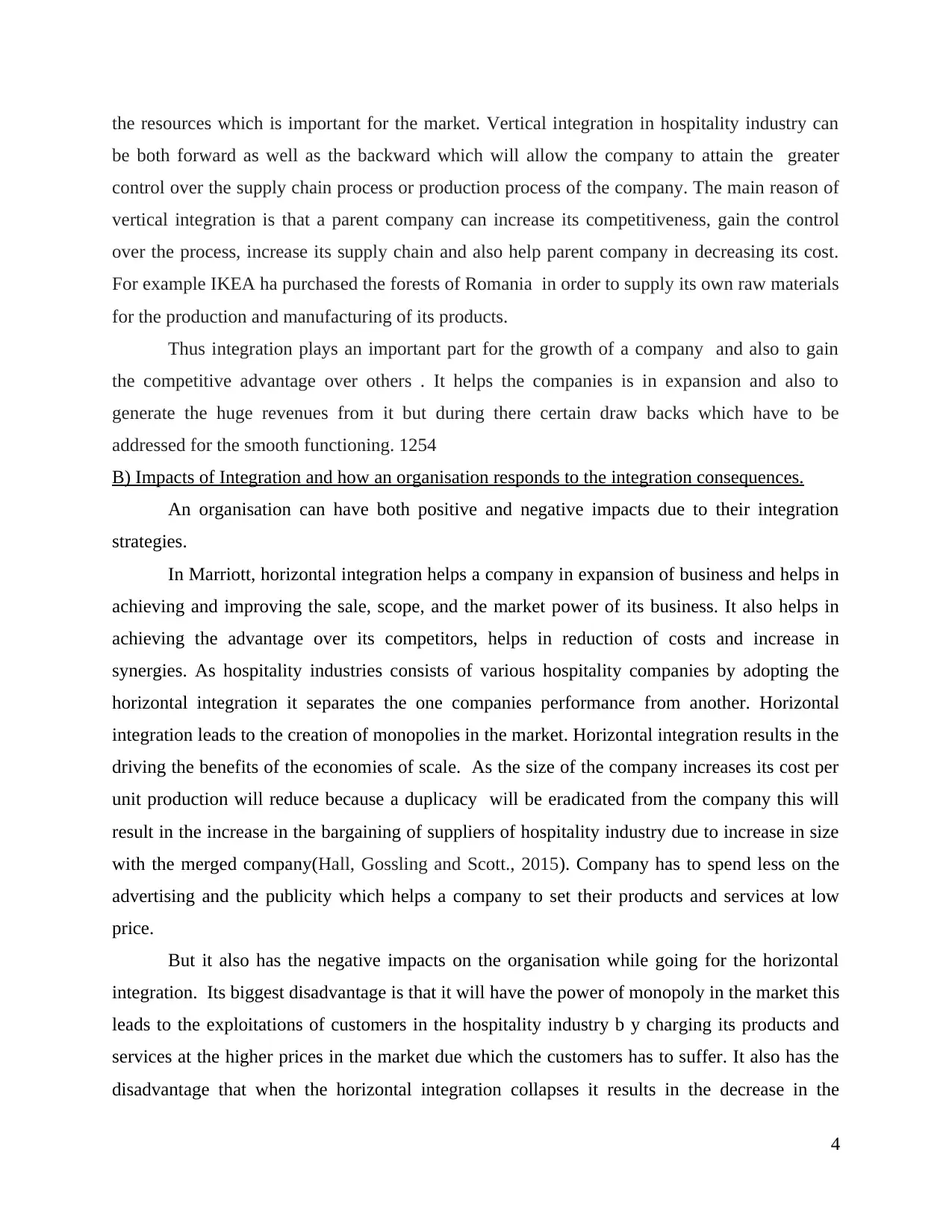
the resources which is important for the market. Vertical integration in hospitality industry can
be both forward as well as the backward which will allow the company to attain the greater
control over the supply chain process or production process of the company. The main reason of
vertical integration is that a parent company can increase its competitiveness, gain the control
over the process, increase its supply chain and also help parent company in decreasing its cost.
For example IKEA ha purchased the forests of Romania in order to supply its own raw materials
for the production and manufacturing of its products.
Thus integration plays an important part for the growth of a company and also to gain
the competitive advantage over others . It helps the companies is in expansion and also to
generate the huge revenues from it but during there certain draw backs which have to be
addressed for the smooth functioning. 1254
B) Impacts of Integration and how an organisation responds to the integration consequences.
An organisation can have both positive and negative impacts due to their integration
strategies.
In Marriott, horizontal integration helps a company in expansion of business and helps in
achieving and improving the sale, scope, and the market power of its business. It also helps in
achieving the advantage over its competitors, helps in reduction of costs and increase in
synergies. As hospitality industries consists of various hospitality companies by adopting the
horizontal integration it separates the one companies performance from another. Horizontal
integration leads to the creation of monopolies in the market. Horizontal integration results in the
driving the benefits of the economies of scale. As the size of the company increases its cost per
unit production will reduce because a duplicacy will be eradicated from the company this will
result in the increase in the bargaining of suppliers of hospitality industry due to increase in size
with the merged company(Hall, Gossling and Scott., 2015). Company has to spend less on the
advertising and the publicity which helps a company to set their products and services at low
price.
But it also has the negative impacts on the organisation while going for the horizontal
integration. Its biggest disadvantage is that it will have the power of monopoly in the market this
leads to the exploitations of customers in the hospitality industry b y charging its products and
services at the higher prices in the market due which the customers has to suffer. It also has the
disadvantage that when the horizontal integration collapses it results in the decrease in the
4
be both forward as well as the backward which will allow the company to attain the greater
control over the supply chain process or production process of the company. The main reason of
vertical integration is that a parent company can increase its competitiveness, gain the control
over the process, increase its supply chain and also help parent company in decreasing its cost.
For example IKEA ha purchased the forests of Romania in order to supply its own raw materials
for the production and manufacturing of its products.
Thus integration plays an important part for the growth of a company and also to gain
the competitive advantage over others . It helps the companies is in expansion and also to
generate the huge revenues from it but during there certain draw backs which have to be
addressed for the smooth functioning. 1254
B) Impacts of Integration and how an organisation responds to the integration consequences.
An organisation can have both positive and negative impacts due to their integration
strategies.
In Marriott, horizontal integration helps a company in expansion of business and helps in
achieving and improving the sale, scope, and the market power of its business. It also helps in
achieving the advantage over its competitors, helps in reduction of costs and increase in
synergies. As hospitality industries consists of various hospitality companies by adopting the
horizontal integration it separates the one companies performance from another. Horizontal
integration leads to the creation of monopolies in the market. Horizontal integration results in the
driving the benefits of the economies of scale. As the size of the company increases its cost per
unit production will reduce because a duplicacy will be eradicated from the company this will
result in the increase in the bargaining of suppliers of hospitality industry due to increase in size
with the merged company(Hall, Gossling and Scott., 2015). Company has to spend less on the
advertising and the publicity which helps a company to set their products and services at low
price.
But it also has the negative impacts on the organisation while going for the horizontal
integration. Its biggest disadvantage is that it will have the power of monopoly in the market this
leads to the exploitations of customers in the hospitality industry b y charging its products and
services at the higher prices in the market due which the customers has to suffer. It also has the
disadvantage that when the horizontal integration collapses it results in the decrease in the
4
⊘ This is a preview!⊘
Do you want full access?
Subscribe today to unlock all pages.

Trusted by 1+ million students worldwide
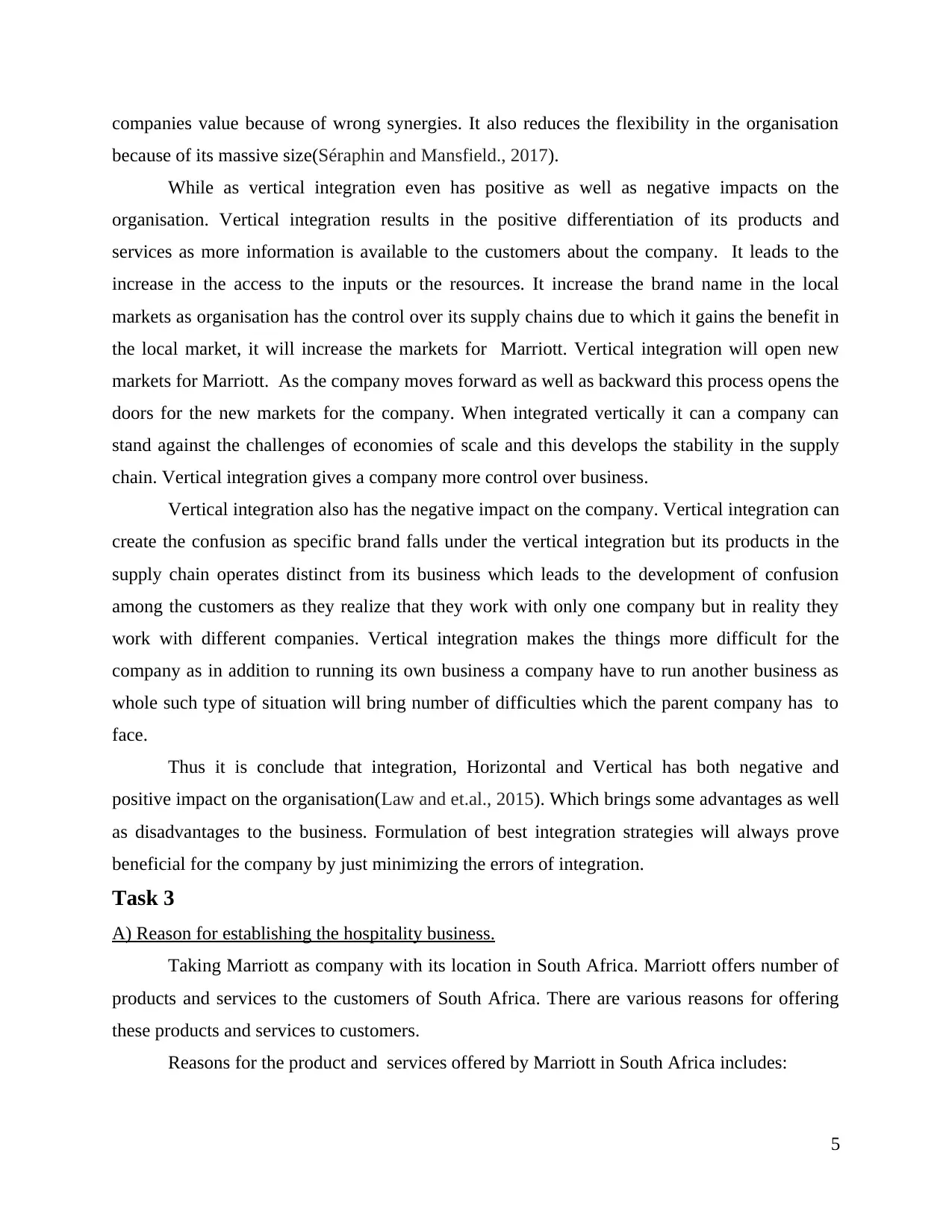
companies value because of wrong synergies. It also reduces the flexibility in the organisation
because of its massive size(Séraphin and Mansfield., 2017).
While as vertical integration even has positive as well as negative impacts on the
organisation. Vertical integration results in the positive differentiation of its products and
services as more information is available to the customers about the company. It leads to the
increase in the access to the inputs or the resources. It increase the brand name in the local
markets as organisation has the control over its supply chains due to which it gains the benefit in
the local market, it will increase the markets for Marriott. Vertical integration will open new
markets for Marriott. As the company moves forward as well as backward this process opens the
doors for the new markets for the company. When integrated vertically it can a company can
stand against the challenges of economies of scale and this develops the stability in the supply
chain. Vertical integration gives a company more control over business.
Vertical integration also has the negative impact on the company. Vertical integration can
create the confusion as specific brand falls under the vertical integration but its products in the
supply chain operates distinct from its business which leads to the development of confusion
among the customers as they realize that they work with only one company but in reality they
work with different companies. Vertical integration makes the things more difficult for the
company as in addition to running its own business a company have to run another business as
whole such type of situation will bring number of difficulties which the parent company has to
face.
Thus it is conclude that integration, Horizontal and Vertical has both negative and
positive impact on the organisation(Law and et.al., 2015). Which brings some advantages as well
as disadvantages to the business. Formulation of best integration strategies will always prove
beneficial for the company by just minimizing the errors of integration.
Task 3
A) Reason for establishing the hospitality business.
Taking Marriott as company with its location in South Africa. Marriott offers number of
products and services to the customers of South Africa. There are various reasons for offering
these products and services to customers.
Reasons for the product and services offered by Marriott in South Africa includes:
5
because of its massive size(Séraphin and Mansfield., 2017).
While as vertical integration even has positive as well as negative impacts on the
organisation. Vertical integration results in the positive differentiation of its products and
services as more information is available to the customers about the company. It leads to the
increase in the access to the inputs or the resources. It increase the brand name in the local
markets as organisation has the control over its supply chains due to which it gains the benefit in
the local market, it will increase the markets for Marriott. Vertical integration will open new
markets for Marriott. As the company moves forward as well as backward this process opens the
doors for the new markets for the company. When integrated vertically it can a company can
stand against the challenges of economies of scale and this develops the stability in the supply
chain. Vertical integration gives a company more control over business.
Vertical integration also has the negative impact on the company. Vertical integration can
create the confusion as specific brand falls under the vertical integration but its products in the
supply chain operates distinct from its business which leads to the development of confusion
among the customers as they realize that they work with only one company but in reality they
work with different companies. Vertical integration makes the things more difficult for the
company as in addition to running its own business a company have to run another business as
whole such type of situation will bring number of difficulties which the parent company has to
face.
Thus it is conclude that integration, Horizontal and Vertical has both negative and
positive impact on the organisation(Law and et.al., 2015). Which brings some advantages as well
as disadvantages to the business. Formulation of best integration strategies will always prove
beneficial for the company by just minimizing the errors of integration.
Task 3
A) Reason for establishing the hospitality business.
Taking Marriott as company with its location in South Africa. Marriott offers number of
products and services to the customers of South Africa. There are various reasons for offering
these products and services to customers.
Reasons for the product and services offered by Marriott in South Africa includes:
5
Paraphrase This Document
Need a fresh take? Get an instant paraphrase of this document with our AI Paraphraser

a) Concierge Desk: This will befits its customers as the customer don't have to book the cabs,
book metros or local buses for travelling from one destination to another(Manhas and
Tukamushaba., 2015). This will ease the customers and customers will get delighted from these
services as they don't have to make the additional researches for it as it is provided by the
company it self.
b) Shuttle Services: In this service a customer is picked and dropped to airport free of cost, this
service will make the customers happy while receiving and during the see off, it will develop
loyalty among the customers.
c) Bread and Breakfast: Company provide the break fast to its customers as per the time
mentioned by the customers.
d) Bar and lounge: customers can buy soft and hard drinks from the bar and lounge. This will
bring earnings to the company and customer don't have to go to other place to avail this service.
e) Membership Program: in this program company gives the points on the bills example if the
bill is around a100 Rand customers gets 10 points and one point is equal to 1 Rand which
customer can avail this offer from any branch of the hotel in South Africa. It will bring two way
benefit both to the customers as well as to the company.
f) Medium and High speed Internet: a company provide both high speed and medium speed
internet to its customers and charges them accordingly(Sari, Bulut and Pirnar., 2016). This will
help the customers to remain connected to the rest of the world which helps the company to get
differentiated for other competitors.
g) Food and Beverages: Company offers multiple cuisine to the customer all across the world. It
also provides the Halal food to its Muslim customers. This help the company in gaining the
competitive advantage over the rest of the hotels present in the country and also will make the its
customers satisfied from the food served by the company.
h) Room services: As usual all hotel companies provide this service and is the important part in
every hotel but in Marriott, this services is provided on the customers demand and also on
normal servicing schedules in order to make sure that the that there is proper cleaning of the
customer rooms. This will improve the brand name and brand image of the company(Mooney,
Harris and Ryan., 2016).
These are the products and services offered by Marriott to its customers in South Africa.
As the performance of the hotel depends upon the product and services offered and the level of
6
book metros or local buses for travelling from one destination to another(Manhas and
Tukamushaba., 2015). This will ease the customers and customers will get delighted from these
services as they don't have to make the additional researches for it as it is provided by the
company it self.
b) Shuttle Services: In this service a customer is picked and dropped to airport free of cost, this
service will make the customers happy while receiving and during the see off, it will develop
loyalty among the customers.
c) Bread and Breakfast: Company provide the break fast to its customers as per the time
mentioned by the customers.
d) Bar and lounge: customers can buy soft and hard drinks from the bar and lounge. This will
bring earnings to the company and customer don't have to go to other place to avail this service.
e) Membership Program: in this program company gives the points on the bills example if the
bill is around a100 Rand customers gets 10 points and one point is equal to 1 Rand which
customer can avail this offer from any branch of the hotel in South Africa. It will bring two way
benefit both to the customers as well as to the company.
f) Medium and High speed Internet: a company provide both high speed and medium speed
internet to its customers and charges them accordingly(Sari, Bulut and Pirnar., 2016). This will
help the customers to remain connected to the rest of the world which helps the company to get
differentiated for other competitors.
g) Food and Beverages: Company offers multiple cuisine to the customer all across the world. It
also provides the Halal food to its Muslim customers. This help the company in gaining the
competitive advantage over the rest of the hotels present in the country and also will make the its
customers satisfied from the food served by the company.
h) Room services: As usual all hotel companies provide this service and is the important part in
every hotel but in Marriott, this services is provided on the customers demand and also on
normal servicing schedules in order to make sure that the that there is proper cleaning of the
customer rooms. This will improve the brand name and brand image of the company(Mooney,
Harris and Ryan., 2016).
These are the products and services offered by Marriott to its customers in South Africa.
As the performance of the hotel depends upon the product and services offered and the level of
6
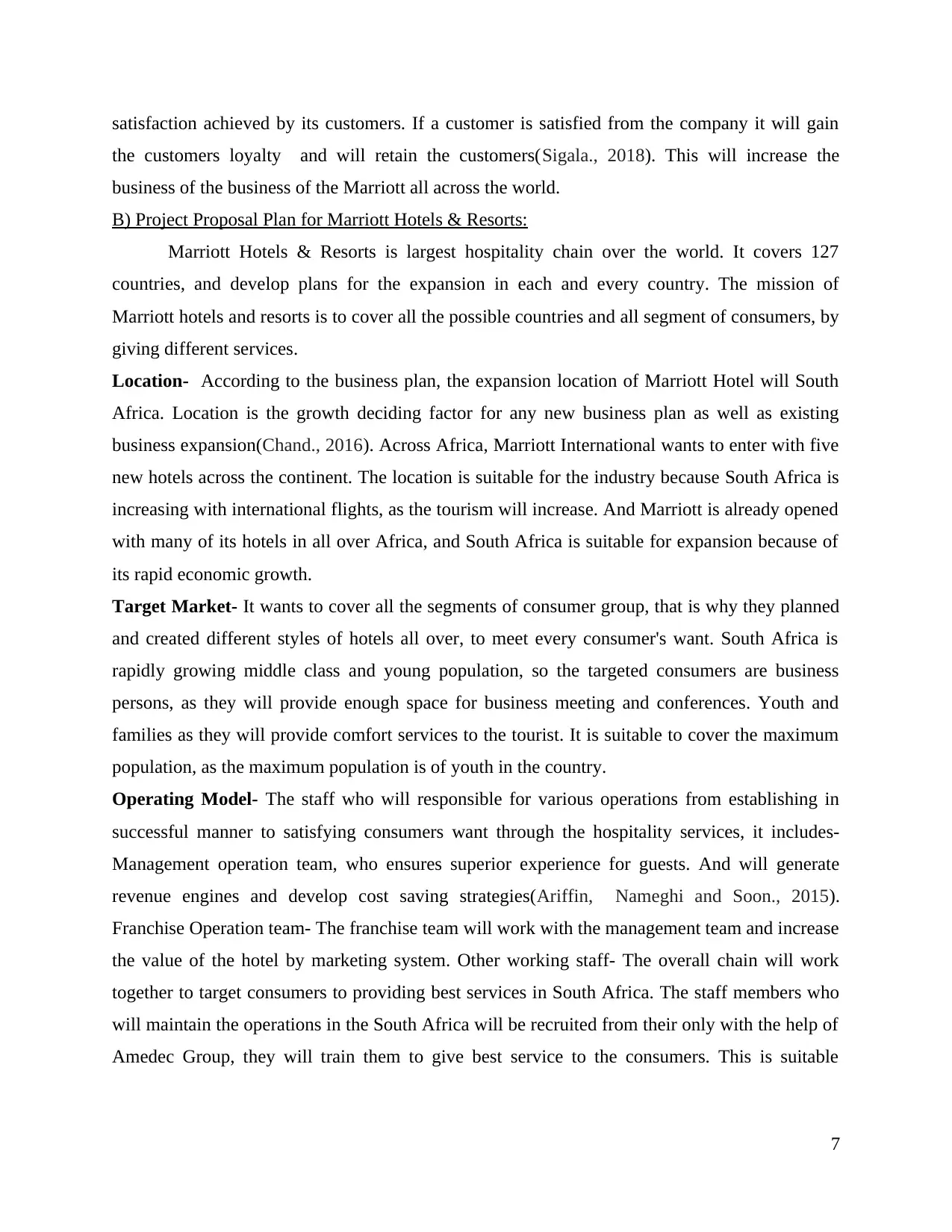
satisfaction achieved by its customers. If a customer is satisfied from the company it will gain
the customers loyalty and will retain the customers(Sigala., 2018). This will increase the
business of the business of the Marriott all across the world.
B) Project Proposal Plan for Marriott Hotels & Resorts:
Marriott Hotels & Resorts is largest hospitality chain over the world. It covers 127
countries, and develop plans for the expansion in each and every country. The mission of
Marriott hotels and resorts is to cover all the possible countries and all segment of consumers, by
giving different services.
Location- According to the business plan, the expansion location of Marriott Hotel will South
Africa. Location is the growth deciding factor for any new business plan as well as existing
business expansion(Chand., 2016). Across Africa, Marriott International wants to enter with five
new hotels across the continent. The location is suitable for the industry because South Africa is
increasing with international flights, as the tourism will increase. And Marriott is already opened
with many of its hotels in all over Africa, and South Africa is suitable for expansion because of
its rapid economic growth.
Target Market- It wants to cover all the segments of consumer group, that is why they planned
and created different styles of hotels all over, to meet every consumer's want. South Africa is
rapidly growing middle class and young population, so the targeted consumers are business
persons, as they will provide enough space for business meeting and conferences. Youth and
families as they will provide comfort services to the tourist. It is suitable to cover the maximum
population, as the maximum population is of youth in the country.
Operating Model- The staff who will responsible for various operations from establishing in
successful manner to satisfying consumers want through the hospitality services, it includes-
Management operation team, who ensures superior experience for guests. And will generate
revenue engines and develop cost saving strategies(Ariffin, Nameghi and Soon., 2015).
Franchise Operation team- The franchise team will work with the management team and increase
the value of the hotel by marketing system. Other working staff- The overall chain will work
together to target consumers to providing best services in South Africa. The staff members who
will maintain the operations in the South Africa will be recruited from their only with the help of
Amedec Group, they will train them to give best service to the consumers. This is suitable
7
the customers loyalty and will retain the customers(Sigala., 2018). This will increase the
business of the business of the Marriott all across the world.
B) Project Proposal Plan for Marriott Hotels & Resorts:
Marriott Hotels & Resorts is largest hospitality chain over the world. It covers 127
countries, and develop plans for the expansion in each and every country. The mission of
Marriott hotels and resorts is to cover all the possible countries and all segment of consumers, by
giving different services.
Location- According to the business plan, the expansion location of Marriott Hotel will South
Africa. Location is the growth deciding factor for any new business plan as well as existing
business expansion(Chand., 2016). Across Africa, Marriott International wants to enter with five
new hotels across the continent. The location is suitable for the industry because South Africa is
increasing with international flights, as the tourism will increase. And Marriott is already opened
with many of its hotels in all over Africa, and South Africa is suitable for expansion because of
its rapid economic growth.
Target Market- It wants to cover all the segments of consumer group, that is why they planned
and created different styles of hotels all over, to meet every consumer's want. South Africa is
rapidly growing middle class and young population, so the targeted consumers are business
persons, as they will provide enough space for business meeting and conferences. Youth and
families as they will provide comfort services to the tourist. It is suitable to cover the maximum
population, as the maximum population is of youth in the country.
Operating Model- The staff who will responsible for various operations from establishing in
successful manner to satisfying consumers want through the hospitality services, it includes-
Management operation team, who ensures superior experience for guests. And will generate
revenue engines and develop cost saving strategies(Ariffin, Nameghi and Soon., 2015).
Franchise Operation team- The franchise team will work with the management team and increase
the value of the hotel by marketing system. Other working staff- The overall chain will work
together to target consumers to providing best services in South Africa. The staff members who
will maintain the operations in the South Africa will be recruited from their only with the help of
Amedec Group, they will train them to give best service to the consumers. This is suitable
7
⊘ This is a preview!⊘
Do you want full access?
Subscribe today to unlock all pages.

Trusted by 1+ million students worldwide
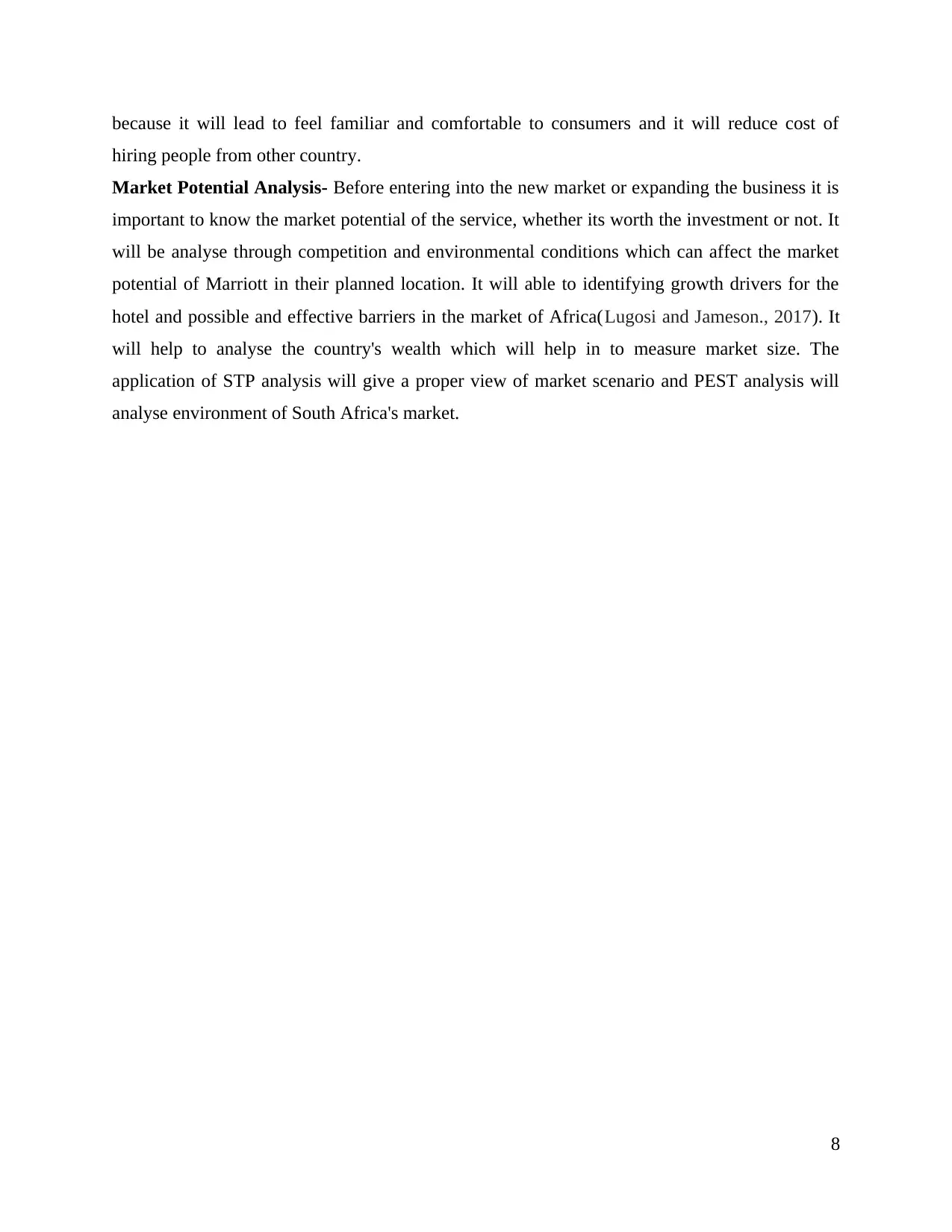
because it will lead to feel familiar and comfortable to consumers and it will reduce cost of
hiring people from other country.
Market Potential Analysis- Before entering into the new market or expanding the business it is
important to know the market potential of the service, whether its worth the investment or not. It
will be analyse through competition and environmental conditions which can affect the market
potential of Marriott in their planned location. It will able to identifying growth drivers for the
hotel and possible and effective barriers in the market of Africa(Lugosi and Jameson., 2017). It
will help to analyse the country's wealth which will help in to measure market size. The
application of STP analysis will give a proper view of market scenario and PEST analysis will
analyse environment of South Africa's market.
8
hiring people from other country.
Market Potential Analysis- Before entering into the new market or expanding the business it is
important to know the market potential of the service, whether its worth the investment or not. It
will be analyse through competition and environmental conditions which can affect the market
potential of Marriott in their planned location. It will able to identifying growth drivers for the
hotel and possible and effective barriers in the market of Africa(Lugosi and Jameson., 2017). It
will help to analyse the country's wealth which will help in to measure market size. The
application of STP analysis will give a proper view of market scenario and PEST analysis will
analyse environment of South Africa's market.
8
Paraphrase This Document
Need a fresh take? Get an instant paraphrase of this document with our AI Paraphraser
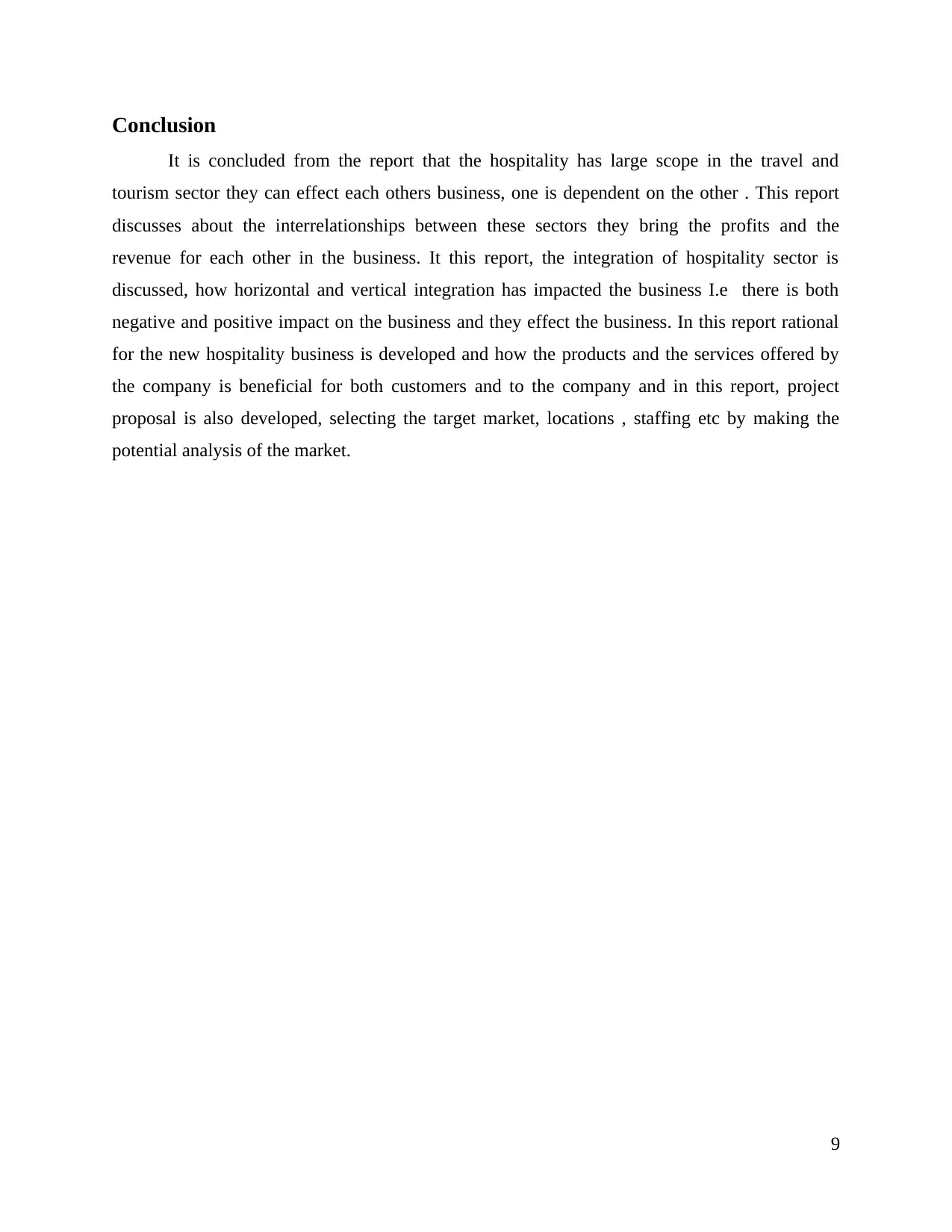
Conclusion
It is concluded from the report that the hospitality has large scope in the travel and
tourism sector they can effect each others business, one is dependent on the other . This report
discusses about the interrelationships between these sectors they bring the profits and the
revenue for each other in the business. It this report, the integration of hospitality sector is
discussed, how horizontal and vertical integration has impacted the business I.e there is both
negative and positive impact on the business and they effect the business. In this report rational
for the new hospitality business is developed and how the products and the services offered by
the company is beneficial for both customers and to the company and in this report, project
proposal is also developed, selecting the target market, locations , staffing etc by making the
potential analysis of the market.
9
It is concluded from the report that the hospitality has large scope in the travel and
tourism sector they can effect each others business, one is dependent on the other . This report
discusses about the interrelationships between these sectors they bring the profits and the
revenue for each other in the business. It this report, the integration of hospitality sector is
discussed, how horizontal and vertical integration has impacted the business I.e there is both
negative and positive impact on the business and they effect the business. In this report rational
for the new hospitality business is developed and how the products and the services offered by
the company is beneficial for both customers and to the company and in this report, project
proposal is also developed, selecting the target market, locations , staffing etc by making the
potential analysis of the market.
9
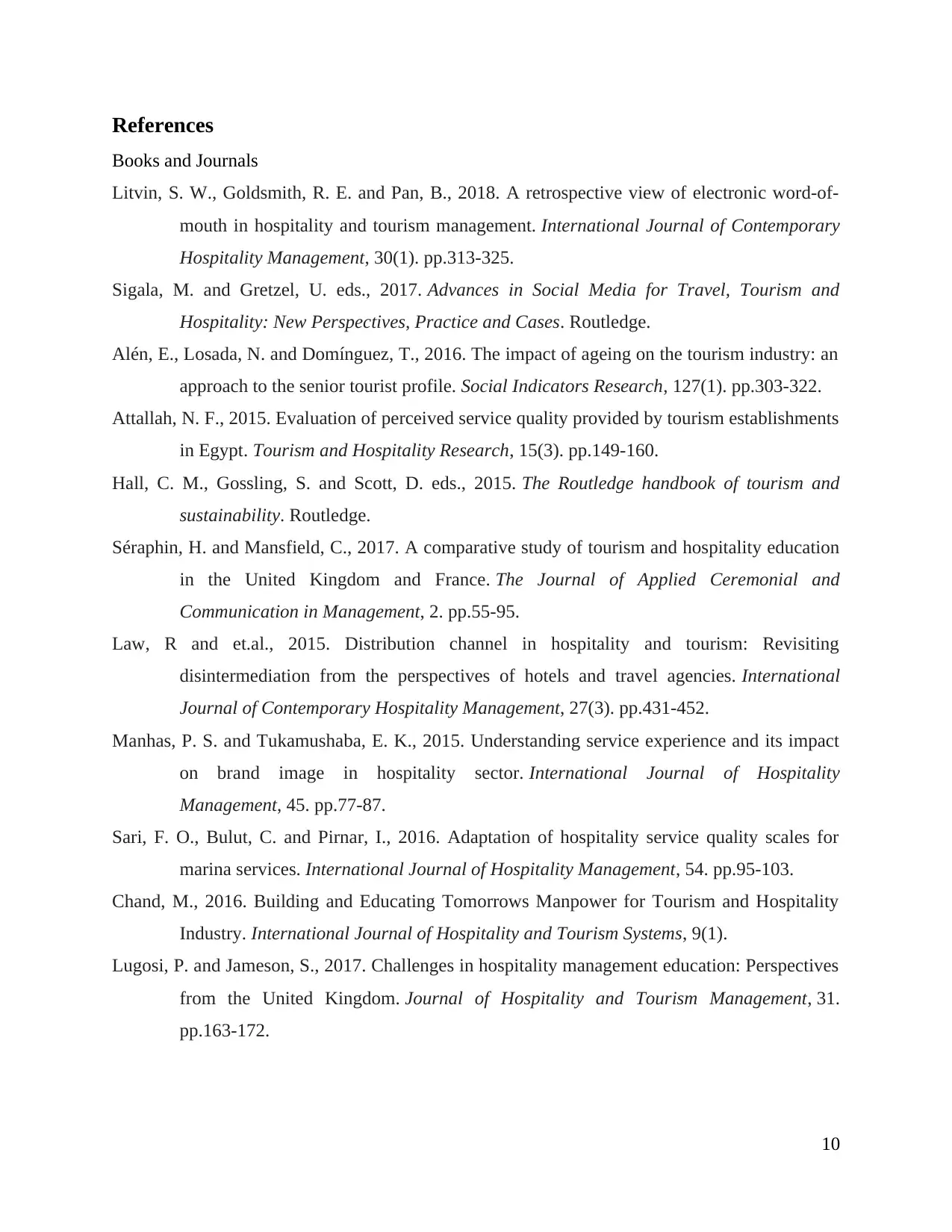
References
Books and Journals
Litvin, S. W., Goldsmith, R. E. and Pan, B., 2018. A retrospective view of electronic word-of-
mouth in hospitality and tourism management. International Journal of Contemporary
Hospitality Management, 30(1). pp.313-325.
Sigala, M. and Gretzel, U. eds., 2017. Advances in Social Media for Travel, Tourism and
Hospitality: New Perspectives, Practice and Cases. Routledge.
Alén, E., Losada, N. and Domínguez, T., 2016. The impact of ageing on the tourism industry: an
approach to the senior tourist profile. Social Indicators Research, 127(1). pp.303-322.
Attallah, N. F., 2015. Evaluation of perceived service quality provided by tourism establishments
in Egypt. Tourism and Hospitality Research, 15(3). pp.149-160.
Hall, C. M., Gossling, S. and Scott, D. eds., 2015. The Routledge handbook of tourism and
sustainability. Routledge.
Séraphin, H. and Mansfield, C., 2017. A comparative study of tourism and hospitality education
in the United Kingdom and France. The Journal of Applied Ceremonial and
Communication in Management, 2. pp.55-95.
Law, R and et.al., 2015. Distribution channel in hospitality and tourism: Revisiting
disintermediation from the perspectives of hotels and travel agencies. International
Journal of Contemporary Hospitality Management, 27(3). pp.431-452.
Manhas, P. S. and Tukamushaba, E. K., 2015. Understanding service experience and its impact
on brand image in hospitality sector. International Journal of Hospitality
Management, 45. pp.77-87.
Sari, F. O., Bulut, C. and Pirnar, I., 2016. Adaptation of hospitality service quality scales for
marina services. International Journal of Hospitality Management, 54. pp.95-103.
Chand, M., 2016. Building and Educating Tomorrows Manpower for Tourism and Hospitality
Industry. International Journal of Hospitality and Tourism Systems, 9(1).
Lugosi, P. and Jameson, S., 2017. Challenges in hospitality management education: Perspectives
from the United Kingdom. Journal of Hospitality and Tourism Management, 31.
pp.163-172.
10
Books and Journals
Litvin, S. W., Goldsmith, R. E. and Pan, B., 2018. A retrospective view of electronic word-of-
mouth in hospitality and tourism management. International Journal of Contemporary
Hospitality Management, 30(1). pp.313-325.
Sigala, M. and Gretzel, U. eds., 2017. Advances in Social Media for Travel, Tourism and
Hospitality: New Perspectives, Practice and Cases. Routledge.
Alén, E., Losada, N. and Domínguez, T., 2016. The impact of ageing on the tourism industry: an
approach to the senior tourist profile. Social Indicators Research, 127(1). pp.303-322.
Attallah, N. F., 2015. Evaluation of perceived service quality provided by tourism establishments
in Egypt. Tourism and Hospitality Research, 15(3). pp.149-160.
Hall, C. M., Gossling, S. and Scott, D. eds., 2015. The Routledge handbook of tourism and
sustainability. Routledge.
Séraphin, H. and Mansfield, C., 2017. A comparative study of tourism and hospitality education
in the United Kingdom and France. The Journal of Applied Ceremonial and
Communication in Management, 2. pp.55-95.
Law, R and et.al., 2015. Distribution channel in hospitality and tourism: Revisiting
disintermediation from the perspectives of hotels and travel agencies. International
Journal of Contemporary Hospitality Management, 27(3). pp.431-452.
Manhas, P. S. and Tukamushaba, E. K., 2015. Understanding service experience and its impact
on brand image in hospitality sector. International Journal of Hospitality
Management, 45. pp.77-87.
Sari, F. O., Bulut, C. and Pirnar, I., 2016. Adaptation of hospitality service quality scales for
marina services. International Journal of Hospitality Management, 54. pp.95-103.
Chand, M., 2016. Building and Educating Tomorrows Manpower for Tourism and Hospitality
Industry. International Journal of Hospitality and Tourism Systems, 9(1).
Lugosi, P. and Jameson, S., 2017. Challenges in hospitality management education: Perspectives
from the United Kingdom. Journal of Hospitality and Tourism Management, 31.
pp.163-172.
10
⊘ This is a preview!⊘
Do you want full access?
Subscribe today to unlock all pages.

Trusted by 1+ million students worldwide
1 out of 13
Related Documents
Your All-in-One AI-Powered Toolkit for Academic Success.
+13062052269
info@desklib.com
Available 24*7 on WhatsApp / Email
![[object Object]](/_next/static/media/star-bottom.7253800d.svg)
Unlock your academic potential
Copyright © 2020–2026 A2Z Services. All Rights Reserved. Developed and managed by ZUCOL.




